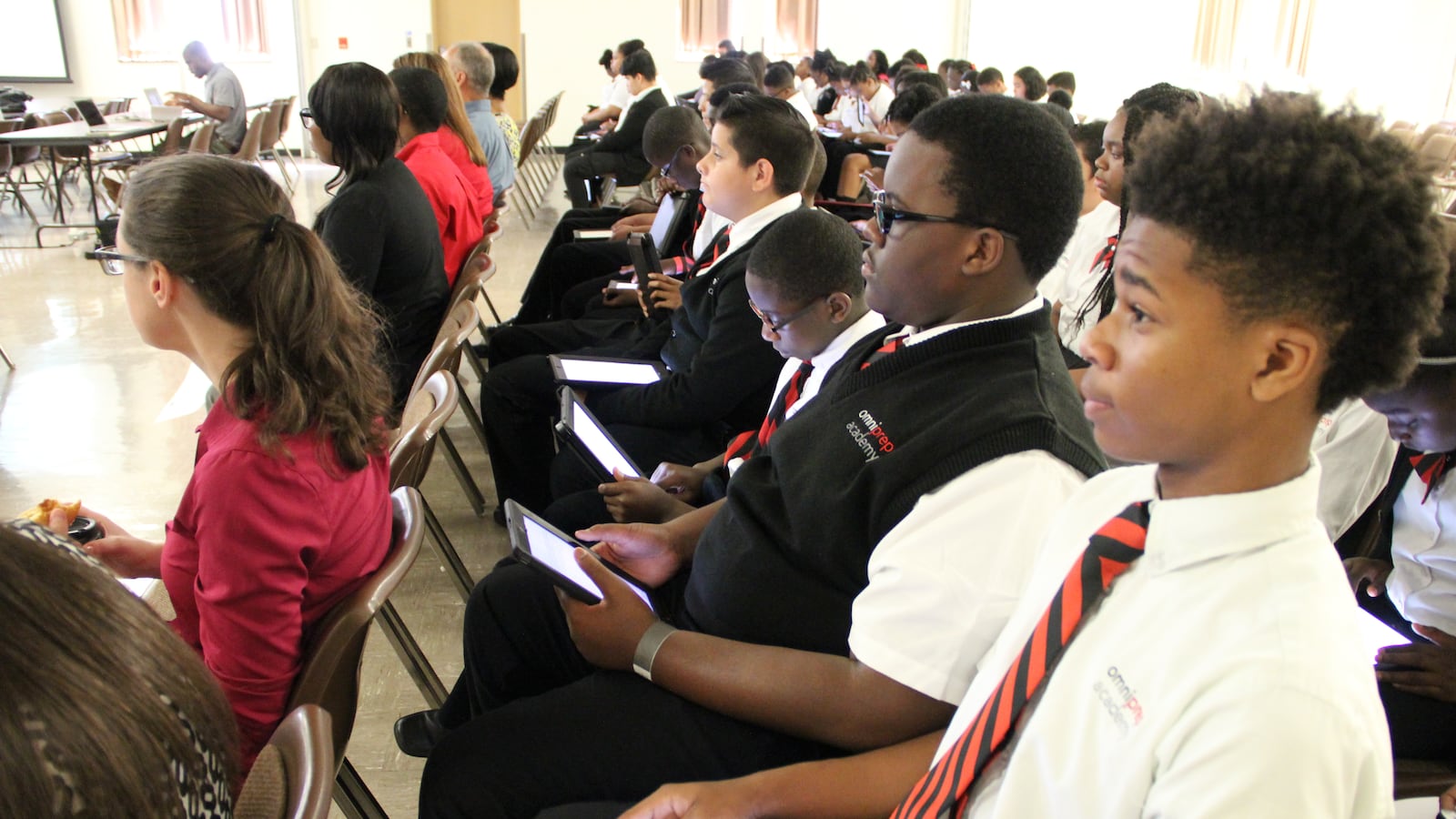Shelby County School administrators conducted an unfair application process for new charter schools based on ambiguous and inconsistent guidelines, Omni Prep administrators told the Tennessee State Board of Education on Wednesday.
That process, they argued, ultimately led the Shelby County Board of Education in July to deny Omni Prep’s request to open a new high school, a decision that the charter operator is now appealing.
Shelby County administrators contend that the academic performance of Omni Prep, which already operates two district-authorized charter schools in Memphis, has lagged and ranks among Tennessee’s worst. Bradley Leon, the district’s chief innovation officer, told state officials that the application process was fair and according to state laws.
The testimony was presented at a hearing at district offices in Memphis as part of the state’s appeals process for charter operators whose applications have been denied by their local school boards.
Wednesday’s hearing was an opportunity for both sides to publicly make their case. State Board of Education officials will meet again with Omni Prep’s charter operator board members and review its application in the coming weeks. The process is scheduled to conclude Sept. 24 when state officials present their recommendations to the State Board of Education on appeals by Omni Prep.
Since 2003, the state has reversed a third of charter school appeals and sent the matter back to local boards for authorization. However, under a new state law, the State Board of Education can become the authorizing agent.
Omni Prep administrators told a three-person state panel about their efforts to boost student test scores through aggressive intervention strategies and teacher coaching. Seventh- and 8th-graders in attendance at the hearing pumped their fists when a local pastor spoke on behalf of the school.
“I know when children are cared for, and I see that at Omni Prep,” said Chris Ellison, pastor of Christ Church in Bartlett. “There’s not a young person back there that’s not been positively touched in one way or another. Whenever elected officials are talking about change, these people produce it; they don’t talk about it. I pray that you take this opportunity to allow these professionals to keep investing in these children’s lives.”
Two charter advocates spoke in support of the district denying the school’s application for a high school.
“The decision provides an opportunity for Omni to give a laser-like focus on its current students,” said Rebecca Lieberman, interim CEO and chief program officer for the Tennessee Charter School Center, which has emphasized that Tennessee charters should be high quality in order for the state’s charter sector to thrive. “Now is the time for them to direct talents and capacity toward that goal. This is the time to prune back the rose bush in hopes of facilitating greater growth and success.”
Omni Prep has operated schools in Memphis since 2010, but the schools have struggled with test scores, enrollment and finances. Last school year, both of its Memphis schools were placed on the priority list of the state’s 5 percent of lowest-performing schools, making them eligible to be closed by the state under a 2014 state law. However, that law was amended by the legislature this year, and local district administrators allowed the schools to stay open.
When Omni Prep applied this spring to open a high school to complement its elementary and middle schools, Shelby County administrators gawked.
“We want to make sure the conditions in their current schools would dramatically improve before they open another school,” Leon said.
Leon told the state panel othat Omni Prep’s elementary and middle schools performed worse last school year than the average Shelby County traditional public school or district-authorized charter school, even though the schools serve students with similar demographics. He said more than a fifth of Omni Prep’s students were suspended last school year, higher than other district schools.
Omni Prep founder Cary Booker said the district had pledged to give in-person interviews with charter applicants at the beginning of the application process, which would have provided an opportunity to explain test scores and strategies for improving them. While several other charter applicants were given in-person interviews, Omni Prep was not.
“They were making up the process as they were going along,” Booker said. “It made no sense.”
Leon said the in-person interview provision was for applications in which the district needed more information or clarification — which district administrators didn’t need for Omni Prep.
“The school’s past performance spoke for itself,” Leon said.
Booker said the school’s relationship with the district has soured over the years. Booker charged that, at one point, Leon threatened to “drag Omni Prep’s name through the mud” by telling the media about their troubles. Leon denied the accusation.
Booker said the district didn’t inform applicants how they would evaluate charter operators’ past performance. But Leon said the state’s own evaluation system is clear about what qualifies as an underperforming school.
“We’re tasked by the public to run a responsible authorization process and that’s what we did,” Leon said.
Leon said the district is working to clarify its evaluation process for charters, which will be made public later this year.
“Personally, I’m very supportive of the appeals process,” Leon said. “I’m glad there’s a mechanism in place for the state to weigh in. I hope that they’ll share our perspective on our decision. I think the board and the administration are on one accord on this.”
Correction: This story originally misidentified the panelists. They are officials from the State Board of Education.

